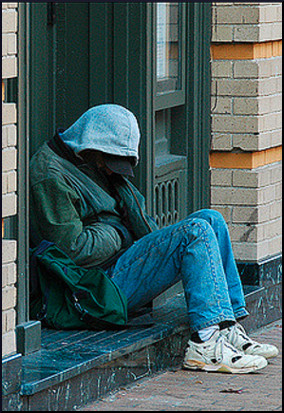
Amongst the year’s news research, one of the more interesting comments from the public to be discovered came from “pdquick,” who worked in the streets for years as a paramedic, and later as a doctor in a program for people experiencing homelessness. This person was reacting to a video clip about San Francisco‘s sit-lie ordinance, and to unkind remarks by other commentators:
If people could overcome addictions with a snap of the fingers, they wouldn’t be addictions, they would just be bad habits… You have no idea the barriers to housing — internal and external — that people face. We have a whole set of policies in place, from draconian drug laws, to public housing policies that essentially make evictees permanently homeless, that stand in the way. Then we put people into buildings where drug dealers knock on the doors all night trying to get you to buy drugs. These are collections of people whose mental illnesses often don’t mesh with each other at all. Then when they ‘fail’ in housing, we send them back to the streets with less stability and less chance at housing than they had before.
The organization Faith Advocates for Jobs, in the winter issue of its newsletter, named Looking Up at the Bottom Line as a “Books of Note” recommendation. This is, of course, the book we see over on the right-hand side of the page, written by Richard R. Troxell, and it is the place to find out how the Universal Living Wage can help you, me, and everybody.
For The Libertarian Alliance (a think tank headquartered in Britain), Kevin Carson wrote a lengthy and well-considered piece on Looking Up at the Bottom Line.
In July, when Austin’s city government announced the sale of a dozen subsidized homes, KUT News reporter Nathan Bernier interviewed Richard. The good news is, the construction of these houses was part of an ongoing program which had already put 30 families into houses. The bad news is, despite the city’s administering nearly 2,000 low-income units, and managing the Section 8 voucher program which affects 5,000 units, both programs have waiting lists numbering in the hundreds of applicants. Richard says,
Most of our ‘affordable housing’ programs have nothing to do with homelessness… We’re talking about people who don’t have anything, and don’t qualify for anything.
Instead, he thinks better results could be obtained by creating a living-wage jobs program that would help homeless people work their way off the street. While roughly half of the people experiencing homelessness in Austin (and the nation) are so disabled they cannot work, the other half are capable of working and indeed want to work. Meanwhile, House the Homeless has been kept extremely busy dealing with the citywide restructuring of funding for all social services that caused the Salvation Army, the Children’s Shelter, and Legal Aid to lose city funding.
John Joel Roberts, of PovertyInsights.org, cited Richard’s book in The Huffington Post article, relating its message to his own locale of Los Angeles:
… [T]he average rent for a one-bedroom apartment, as of May 2011, is $1,315 per month. Many housing experts believe that in order for a person to be able to pay for housed-living (such as food, utilities, transportation and clothing), a person should not pay more than one-third of his monthly income toward rent. That means in Los Angeles, the homeless man standing near the freeway needs to earn $22.76 per hour to afford the average rent for a one-bedroom apartment… Minimum wage in Los Angeles, however, is only $8 per hour. A person earning this rate could barely pay his rent, and would have nothing for food, utilities or anything else. In other words, he would be sitting in an empty apartment, darkened because of no electricity, and hungry because of not enough income to buy food.
If it makes sense to you that a person working 40 hours a week should be able to afford a roof over his or her head other than a bridge, then the Universal Living Wage makes sense too. Every member of Congress and every state Governor have been sent a copy of Looking Up at the Bottom Line. So has the President. Why not write or email them? Tell them that Troxell’s idea will stabilize small businesses, stimulate the housing industry and the economy generally, end economic homelessness for over one million minimum-wage workers, and prevent it for all 10.1 minimum-wage workers, including our returning veterans.
Reactions?
Source: “Homeless React to Sit/Lie,” MissionLocal.org, 11/11/10
Source: “Richard R. Troxell. Looking Up at the Bottom Line: The Struggle for the Living Wage,” The Libertarian Alliance: Blog, 04/27/11
Source: “City Selling 12 Subsidized Homes For $110,000 Each,” KUT News, 07/05/11
Source: “Unlivable Wages Mean Unlivable Conditions,” The Huffington Post, 06/09/11
Image by jdn (Jack Newton), used under its Creative Commons license.


